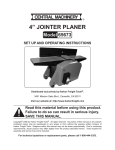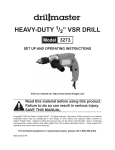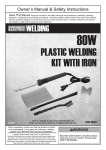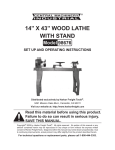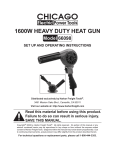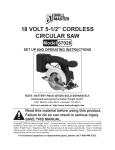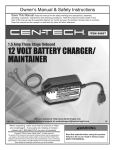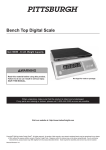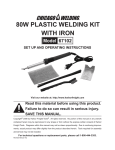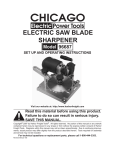Download Harbor Freight Tools 120 Volt Portable Utility Pump 1500 GPH Product manual
Transcript
Portable Utility Pump 65836 Set up and Operating Instructions Distributed exclusively by Harbor Freight Tools®. 3491 Mission Oaks Blvd., Camarillo, CA 93011 Visit our website at: http://www.harborfreight.com Read this material before using this product. Failure to do so can result in serious injury. Save this manual. Copyright© 2008 by Harbor Freight Tools®. All rights reserved. No portion of this manual or any artwork contained herein may be reproduced in any shape or form without the express written consent of Harbor Freight Tools. Diagrams within this manual may not be drawn proportionally. Due to continuing improvements, actual product may differ slightly from the product described herein. Tools required for assembly and service may not be included. For technical questions or replacement parts, please call 1-800-444-3353. Save This Manual NOTICE is used to address practices not related to personal injury. Keep this manual for the safety warnings and precautions, assembly, operating, inspection, maintenance and cleaning procedures. Write the product’s serial number in the back of the manual near the assembly diagram (or month and year of purchase if product has no number). Keep this manual and the receipt in a safe and dry place for future reference. CAUTION, without the safety alert symbol, is used to address practices not related to personal injury. General Power Tool Safety Warnings Important SAFETY Information WARNING Read all safety warnings and instructions. Failure to follow the warnings and instructions may result in electric shock, fire and/or serious injury. Save all warnings and instructions for future reference. The term ″power tool″ in the warnings refers to your mainsoperated (corded) power tool or battery-operated (cordless) power tool. In this manual, on the labeling, and all other information provided with this product: This is the safety alert symbol. It is used to alert you to potential personal injury hazards. Obey all safety messages that follow this symbol to avoid possible injury or death. 1. a.Keep work area clean and well lit. Cluttered or dark areas invite accidents. DANGER indicates a hazardous situation which, if not avoided, will result in death or serious injury. b.Do not operate power tools in explosive atmospheres, such as in the presence of flammable liquids, gases or dust. Power tools create sparks which may ignite the dust or fumes. WARNING indicates a hazardous situation which, if not avoided, could result in death or serious injury. CAUTION, used with the safety alert symbol, indicates a hazardous situation which, if not avoided, could result in minor or moderate injury. SKU 65836 Work area safety c.Keep children and bystanders away while operating a power tool. Distractions can cause you to lose control. 2. Electrical safety a.Power tool plugs must match the outlet. Never modify the plug in any way. Do not use any adapter For technical questions, please call 1-800-444-3353. Page 2 plugs with grounded power tools. Unmodified plugs and matching outlets will reduce risk of electric shock. b.Avoid body contact with grounded surfaces such as pipes, radiators, ranges and refrigerators. There is an increased risk of electric shock if your body is grounded. c.Do not expose power tools to rain or wet conditions. Water entering a power tool will increase the risk of electric shock. d.Do not abuse the cord. Never use the cord for carrying, pulling or unplugging the power tool. Keep cord away from heat, oil, sharp edges or moving parts. Damaged or entangled cords increase the risk of electric shock. e.When operating a power tool outdoors, use an extension cord suitable for outdoor use. Use of a cord suitable for outdoor use reduces the risk of electric shock. f. If operating a power tool in a damp location is unavoidable, use a Ground Fault Circuit Interrupter (GFCI) protected supply. Use of a GFCI reduces the risk of electric shock. 3. Personal safety a.Stay alert, watch what you are doing and use common sense when operating a power tool. Do not use a power tool while you are tired or under the influence of drugs, alcohol or medication. A moment of inattention while operating power tools may result in serious personal injury. b.Use personal protective equipment. Always wear eye protection. SKU 65836 Safety equipment such as dust mask, non-skid safety shoes, hard hat, or hearing protection used for appropriate conditions will reduce personal injuries. c.Prevent unintentional starting. Ensure the switch is in the off-position before connecting to power source and/or battery pack, picking up or carrying the tool. Carrying power tools with your finger on the switch or energizing power tools that have the switch on invites accidents. d.Remove any adjusting key or wrench before turning the power tool on. A wrench or a key left attached to a rotating part of the power tool may result in personal injury. e.Do not overreach. Keep proper footing and balance at all times. This enables better control of the power tool in unexpected situations. f. Dress properly. Do not wear loose clothing or jewelry. Keep your hair, clothing and gloves away from moving parts. Loose clothes, jewelry or long hair can be caught in moving parts. g.If devices are provided for the connection of dust extraction and collection facilities, ensure these are connected and properly used. Use of these devices can reduce dust-related hazards. h.Only use safety equipment that has been approved by an appropriate standards agency. Unapproved safety equipment may not provide adequate protection. Eye protection must be ANSI-approved and breathing protection must be NIOSH-ap- For technical questions, please call 1-800-444-3353. Page 3 g.Use the power tool, accessories and tool bits etc. in accordance with these instructions, taking into account the working conditions and the work to be performed. Use of the power tool for operations different from those intended could result in a hazardous situation. proved for the specific hazards in the work area. 4. Power tool use and care a.Do not force the power tool. Use the correct power tool for your application. The correct power tool will do the job better and safer at the rate for which it was designed. b.Do not use the power tool if the switch does not turn it on and off. Any power tool that cannot be controlled with the switch is dangerous and must be repaired. c.Disconnect the plug from the power source and/or the battery pack from the power tool before making any adjustments, changing accessories, or storing power tools. Such preventive safety measures reduce the risk of starting the power tool accidentally. d.Store idle power tools out of the reach of children and do not allow persons unfamiliar with the power tool or these instructions to operate the power tool. Power tools are dangerous in the hands of untrained users. e.Maintain power tools. Check for misalignment or binding of moving parts, breakage of parts and any other condition that may affect the power tool’s operation. If damaged, have the power tool repaired before use. Many accidents are caused by poorly maintained power tools. f. Keep cutting tools sharp and clean. Properly maintained cutting tools with sharp cutting edges are less likely to bind and are easier to control. SKU 65836 6. Service a.Have your power tool serviced by a qualified repair person using only identical replacement parts. This will ensure that the safety of the power tool is maintained. Portable Pump Safety Warnings 1. Maintain labels and nameplates on the tool. These carry important safety information. If unreadable or missing, contact Harbor Freight Tools for a replacement. 2. Avoid unintentional starting. Prepare to begin work before turning on the tool. 3. Do not leave the tool unattended when it is plugged into an electrical outlet. Turn off the tool, and unplug it from its electrical outlet before leaving. 4. This product is not a toy. Keep it out of reach of children. 5. People with pacemakers should consult their physician(s) before use. Electromagnetic fields in close proximity to heart pacemaker could cause pacemaker interference or pacemaker failure. In addition, people with pacemakers should: • Avoid operating alone. • Do not use with power switch locked on. For technical questions, please call 1-800-444-3353. Page 4 Grounding • Properly maintain and inspect to avoid electrical shock. • Any power cord must be properly grounded. Ground Fault Circuit Interrupter (GFCI) should also be implemented – it prevents sustained electrical shock. 6. WARNING: Handling the cord on this product will expose you to lead, a chemical known to the State of California to cause cancer, and birth defects or other reproductive harm. Wash hands after handling. (California Health & Safety Code § 25249.5, et seq.) 7. WARNING: The brass components of this product contain lead, a chemical known to the State of California to cause birth defects (or other reproductive harm). (California Health & Safety code § 25249.5, et seq.) 8. The warnings, precautions, and instructions discussed in this instruction manual cannot cover all possible conditions and situations that may occur. It must be understood by the operator that common sense and caution are factors which cannot be built into this product, but must be supplied by the operator. Save these instructions. SKU 65836 To prevent electric shock and death from incorrect grounding wire connection: Check with a qualified electrician if you are in doubt as to whether the outlet is properly grounded. Do not modify the power cord plug provided with the tool. Never remove the grounding prong from the plug. Do not use the tool if the power cord or plug is damaged. If damaged, have it repaired by a service facility before use. If the plug will not fit the outlet, have a proper outlet installed by a qualified electrician. Grounded Tools: Tools with Three Prong Plugs 1. Tools marked with “Grounding Required” have a three wire cord and three prong grounding plug. The plug must be connected to a properly grounded outlet. If the tool should electrically malfunction or break down, grounding provides a low resistance path to carry electricity away from the user, reducing the risk For technical questions, please call 1-800-444-3353. Page 5 of electric shock. (See 3-Prong Plug and Outlet.) 2. 3. The grounding prong in the plug is connected through the green wire inside the cord to the grounding system in the tool. The green wire in the cord must be the only wire connected to 1. the tool’s grounding system and must never be attached to an electrically “live” terminal. (See 3-Prong Plug and Outlet.) 2. The tool must be plugged into an appropriate outlet, properly installed and grounded in accordance with all codes and ordinances. The plug and outlet should look like those in the preceding illustration. (See 3-Prong Plug and Outlet.) Double Insulated Tools: Tools with Two Prong Plugs 1. 2. Tools marked “Double Insulated” do not require grounding. They have a special double insulation system which satisfies OSHA requirements and complies with the applicable standards of Underwriters Laboratories, Inc., the Canadian Standard Association, and the National Electrical Code. (See Outlets for 2-Prong Plug.) SKU 65836 Double insulated tools may be used in either of the 120 volt outlets shown in the preceding illustration. (See Outlets for 2-Prong Plug.) Extension Cords Grounded tools require a three wire extension cord. Double Insulated tools can use either a two or three wire extension cord. As the distance from the supply outlet increases, you must use a heavier gauge extension cord. Using extension cords with inadequately sized wire causes a serious drop in voltage, resulting in loss of power and possible tool damage. (See Table A.) 3. The smaller the gauge number of the wire, the greater the capacity of the cord. For example, a 14 gauge cord can carry a higher current than a 16 gauge cord. (See Table A.) 4. When using more than one extension cord to make up the total length, make sure each cord contains at least the minimum wire size required. (See Table A.) 5. If you are using one extension cord for more than one tool, add the nameplate amperes and use the sum to determine the required minimum cord size. (See Table A.) 6. If you are using an extension cord outdoors, make sure it is marked with the suffix “W-A” (“W” in Canada) to indicate it is acceptable for outdoor use. 7. Make sure the extension cord is properly wired and in good electrical con- For technical questions, please call 1-800-444-3353. Page 6 dition. Always replace a damaged extension cord or have it repaired by a qualified electrician before using it. 8. Protect the extension cords from sharp objects, excessive heat, and damp or wet areas. RECOMMENDED MINIMUM WIRE GAUGE FOR EXTENSION CORDS* (120/240 VOLT) (at full load) 50’ 75’ 100’ 150’ EXTENSION CORD LENGTH 25’ NAMEPLATE AMPERES 0 – 2.0 18 18 18 18 16 2.1 – 3.4 18 18 18 16 14 3.5 – 5.0 18 18 16 14 12 5.1 – 7.0 18 16 14 12 12 7.1 – 12.0 18 14 12 10 - 12.1 – 16.0 14 12 10 - - 16.1 – 20.0 12 10 - - - TABLE A * Based on limiting the line voltage drop to five volts at 150% of the rated amperes. Symbology Double Insulated Canadian Standards Association Underwriters Laboratories, Inc. V~ A Volts Alternating Current Amperes No Load Revolutions per Minute n0 xxxx/min. (RPM) SKU 65836 For technical questions, please call 1-800-444-3353. Page 7 Specifications Electrical Requirements 115 V~ / 60 Hz / 8.4 A Pumping Capacity 1500 GPH Max. Inlet & Outlet Size 1” x 11.5 TPI (Standard Hose Size) Pump Lift Capacity 120 Feet Note: For additional information regarding the parts listed in the following pages, refer to the Assembly Diagram near the end of this manual. Assembly 1. Inlet and outlet hoses (not included) must be attached to pump prior to use. 2. Attach inlet and outlet hoses to Hose Fittings (3) on Pup Facing (2). Standard garden hose fitting will work. 3. Attach the Accessory Basket Filter included with the Pump to the inlet end of the inlet hose. The strainer will prevent foreign material from entering the pump and damaging or jamming it. Unpacking When unpacking, check to make sure that the item is intact and undamaged. If any parts are missing or broken, please call Harbor Freight Tools at the number shown on the cover of this manual as soon as possible. List of contents Description Q’ty Portable Utility Pump 1 Basket Filter 1 Instructions for putting into use Read the entire Important Safety Information section at the beginning of this manual including all text under subheadings therein before set up or use of this product. To prevent serious injury from accidental operation: Turn the Power Switch of the tool to its “OFF” position and unplug the tool from its electrical outlet before assembling or making any adjustments to the tool. SKU 65836 Mounting 1. Pump should be firmly mounted on a stabile base prior to use. 2. The pump and its electrical connections should be mounted so that they remain dry. Water may damage the pump if it enters any electrical component. Functions 1. This pump is useful for pumping clean water. Do not use for dirty water containing large particulates. Operating Instructions Read the entire Important Safety Information section at the beginning of this manual including all text under subheadings therein before set up or use of this product. For technical questions, please call 1-800-444-3353. Page 8 Tool Set Up To prevent serious injury from accidental operation: Turn the Power Switch of the tool to its “OFF” position and unplug the tool from its electrical outlet before performing any inspection, maintenance, or cleaning procedures. 1. This pump operates immediately when plugged in. Do not plug in this pump when dry. Always prime pump before plugging in. 5. General Operating Instructions 1. Attach inlet and outlet hoses (not included) to pump. Standard garden hoses will work. 2. Attach accessory Basket Filter to inlet end of inlet hose. 3. Place basket filter end of inlet hose in water to be pumped. 4. Rout outlet hose so that pumped water will run off appropriately. 5. Remove Priming Plug (4) by turning counterclockwise. Fill pump with clean water. Replace Priming Plug by turning clockwise. 6. Plug in Power Cord (22). Pump will operate immediately. It will take a few minutes for pump to prime and remove air from inlet hose. Water will then flow through the hoses and pump. 7. Do not allow the Basket Filter to become clogged. Check it periodically to be sure that clear water can enter the inlet hose. Work Piece and Work Area Set Up 1. Designate a work area that is clean and well-lit. The work area must not allow access by children or pets to prevent injury and distraction. 2. Route the power cord along a safe route to reach the work area without creating a tripping hazard or exposing the power cord to possible damage. The power cord must reach the work area with enough extra length to allow free movement while working. Never operate this tool in explosive atmospheres. 3. There must not be hazardous objects, such as utility lines or foreign objects, nearby that will present a hazard while working. 8. Do not allow the pump to run dry. Running dry, the pump will overheat, and impeller and seals will be damaged. 4. Protect yourself and others from risk of electrical shock. Always wear insulated boots and gloves. Stay out of water or wet surfaces. Protect the pump and its power cord from moisture. 9. To prevent accidents, turn off the tool and disconnect its power supply after use. Clean, then store the tool indoors out of children’s reach. SKU 65836 For technical questions, please call 1-800-444-3353. Page 9 Maintenance And Servicing Procedures not specifically explained in this manual must be performed only by a qualified technician. To prevent serious injury from accidental operation: Unplug the tool from its electrical outlet before performing any inspection, maintenance, or cleaning procedures. To prevent serious injury from tool failure: Do not use damaged equipment. If abnormal noise or vibration occurs, have the problem corrected before further use. a.Remove the brush cap on each side of the motor housing. b.Remove the carbon brushes from the housing. Keep track of which orientation the old carbon brushes were in to prevent needless wear if they will be reinstalled. c. If either carbon brush is worn down by more than 1/2, replace both carbon brushes. d.To clean old carbon brushes before reusing them, rub the contact areas with a pencil eraser. e.Reinsert the old carbon brushes in the same orientation to reduce wear. f. When installing the carbon brushes, make sure the carbon portions of the carbon brushes contact the motor armature, and that the springs face away from the motor. Also, make sure the springs operate freely. g. Replace the brush caps. Do not overtighten. Cleaning, Maintenance, and Lubrication 1. BEFORE EACH USE, inspect the general condition of the tool. Check for loose screws, misalignment or binding of moving parts, cracked or broken parts, damaged electrical wiring, and any other condition that may affect its safe operation. Carbon Brush Holder Carbon Brush Carbon Brush Cap 2. After Use, clean external surfaces of the tool with clean cloth. Note: New carbon brushes tend to spark when first used until they wear and conform to the motor’s armature. 3. Carbon Brush Maintenance. The carbon brushes may require maintenance when the motor performance of the tool decreases or stops working completely. To maintain the brushes: WARNING! If the supply cord of this power tool is damaged, it must be replaced only by a qualified service technician. SKU 65836 For technical questions, please call 1-800-444-3353. Page 10 Troubleshooting Problem Possible Causes Likely Solutions Tool will not start 1. No power at outlet. 2. Cord not connected. 3. Worn out or damaged Carbon Brushes. 1. Check power at outlet. 2. Check that cord is plugged in. 3. Replace Carbon Brushes. Pump operates but does not pump water 1. Pump is not primed. 2. Basket Filter is clogged. 3. All water has been pumped out. 1. Prime pump, see instructions page 9. 2. Check and clean basket filter. 3. Turn off pump and complete mop up by hand. 4. Repair or replace Impeller as needed. 4. Impeller is worn out or jammed Follow all safety precautions whenever diagnosing or servicing the tool. Disconnect power supply before service. PLEASE READ THE FOLLOWING CAREFULLY The manufacturer and/or distributor has provided the parts list and assembly diagram in this manual as a reference tool only. Neither the manufacturer or distributor makes any representation or warranty of any kind to the buyer that he or she is qualified to make any repairs to the product, or that he or she is qualified to replace any parts of the product. In fact, the manufacturer and/or distributor expressly states that all repairs and parts replacements should be undertaken by certified and licensed technicians, and not by the buyer. The buyer assumes all risk and liability arising out of his or her repairs to the original product or replacement parts thereto, or arising out of his or her installation of replacement parts thereto. Parts List Part Description Qty. Part Parts List Description Qty. 1 Rubber Foot 3 15 Pump Housing 1 2 Pump Facing 1 16 Carbon Brush Cap 2 3 Hose Fitting 2 17 Carbon Brush 2 4 Priming Plug 1 18 Carbon Brush Holder 2 5 Pump Gasket 1 19 Screw 2 6 Impeller 1 20 Spring Washer m6 4 7 Pump Impeller Fitting 1 21 Screw m6 x 20 6 8 Pump Seal Gasket 1 22 Power Cord 1 9 Pump Back Wall 1 23 Grounding Screw 1 10 Bearing 600 1 24 Cable Clamp 1 11 Armature 1 25 Cable Box 1 12 Bearing 608 1 26 Screw m4 x 10 2 13 Screw m 4 x 60 2 27 Cable Clip 1 14 Stator 1 28 Basket Filter (not shown) 1 Record Product’s Serial Number Here: Note: If product has no serial number, record month and year of purchase instead. Note: Some parts are listed and shown for illustration purposes only, and are not available individually as replacement parts. SKU 65836 For technical questions, please call 1-800-444-3353. Page 11 ASSEMBLY DIAGRAM SKU 65836 For technical questions, please call 1-800-444-3353. Page 12












